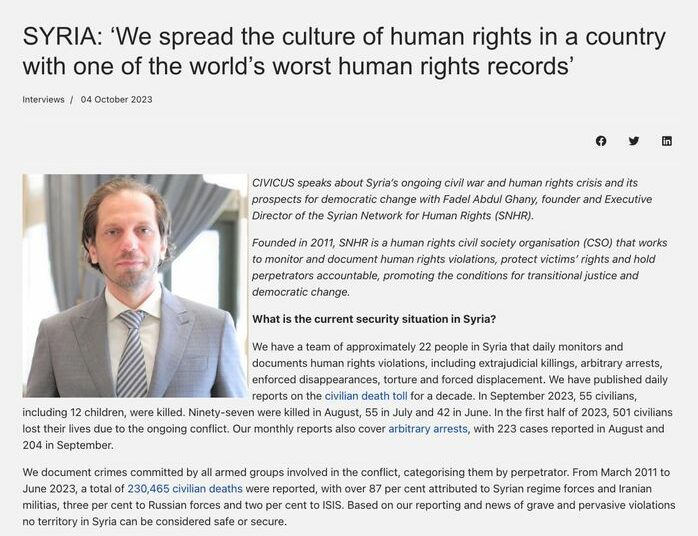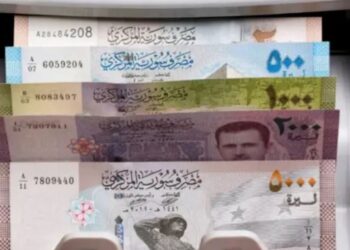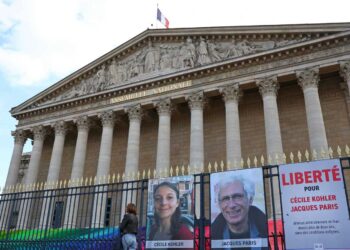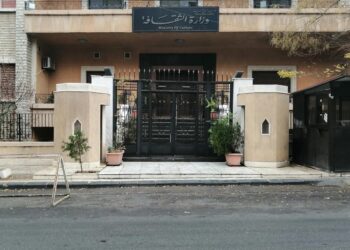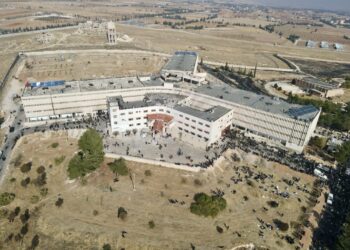CIVICUS speaks about Syria’s ongoing civil war and human rights crisis and its prospects for democratic change with Fadel Abdul Ghany, founder and Executive Director of the Syrian Network for Human Rights (SNHR).
Founded in 2011, SNHR is a human rights civil society organisation (CSO) that works to monitor and document human rights violations, protect victims’ rights and hold perpetrators accountable, promoting the conditions for transitional justice and democratic change.
What is the current security situation in Syria?
We have a team of approximately 22 people in Syria that daily monitors and documents human rights violations, including extrajudicial killings, arbitrary arrests, enforced disappearances, torture and forced displacement. We have published daily reports on the civilian death toll for a decade. In September 2023, 55 civilians, including 12 children, were killed. Ninety-seven were killed in August, 55 in July and 42 in June. In the first half of 2023, 501 civilians lost their lives due to the ongoing conflict. Our monthly reports also cover arbitrary arrests, with 223 cases reported in August and 204 in September.
We document crimes committed by all armed groups involved in the conflict, categorising them by perpetrator. From March 2011 to June 2023, a total of 230,465 civilian deaths were reported, with over 87 per cent attributed to Syrian regime forces and Iranian militias, three per cent to Russian forces and two per cent to ISIS. Based on our reporting and news of grave and pervasive violations no territory in Syria can be considered safe or secure.
What are the working conditions for your colleagues in Syria?
We consider ourselves on the frontline because we document violations on the ground and identify perpetrators. Our team operates discreetly in Syria, either from the office or from their homes using fantasy names. We safeguard their identities for security reasons. Their safety is more important than any documentation.
Our team faces intense pressure, and if arbitrarily arrested, they risk severe torture by the regime led by Bashar al-Assad or other parties. We do our best to protect and provide security education to our staff. Our IT infrastructure is highly secure, and we’ve implemented measures to thwart cyber-attacks, which have included Russian attempts to hack our website.
What’s the situation for Syrian refugees?
Many Syrians aren’t safe in other countries either. In Lebanon and Turkey, refugees face the risk of forced return to Syria in violation of international law, specifically the 1951 Refugee Convention. Conditions are dire, with Syrians often blamed for economic hardship in host countries, even though Lebanon and Turkey receive substantial funding from the European Union and other donors to welcome refugees.
The feeling of insecurity and lack of proper protection in neighbouring countries, which host over 70 per cent of refugees, drive Syrians towards-called ‘death boats’ to seek safety elsewhere in Europe. The international community should better distribute the responsibility of welcoming refugees, because the current allocation isn’t fair.
What should the international community do to address Syria’s dire human rights and humanitarian situation?
The international community must intensify efforts to achieve a political transition and end Syria’s 13-year-long conflict, which is taking a lot of lives and causing immense suffering, with widespread torture and forced displacement of half the Syrian population. Any prospect of political transition has been absent due to insufficient international pressure on all parties in the conflict, and particularly on the Assad regime, leaving the Syrian people and the conflict largely neglected.
The international community must actively support efforts to fight impunity. The Assad regime has got away with numerous war crimes and crimes against humanity. There should be a collective effort to bring justice. If accountability is to be achieved, it also requires a political transition leading to the establishment of independent local courts.
Chinese and Russian veto power at the United Nations Security Council obstructs the referral of war crimes to the International Criminal Court. With limited universal jurisdiction, only 27 sentences have been issued in Germany and other countries against Syrian war criminals, mostly from non-state terrorist groups such as Al-Nusra or ISIS.
True accountability requires dismantling the Assad regime, the Syrian National Army, the Syrian Democratic Forces, the Islamist organisation of Hay’at Tahrir al-Sham and other non-elected entities ruling Syria through fear.
Aid should be directed to people affected by the recent earthquake and those displaced in northwest and northeast Syria. Continuous assistance is also vital for Middle Eastern states hosting most Syrian refugees. Such comprehensive support on a large scale is essential for advancing the Syrian movement toward democracy.
How is Syrian civil society working for a transition to democracy?
Syrian civil society continues to protest to demand respect for human rights, investigates rights violations and expose perpetrators based on the principle of equality and promote human rights through education. We work hard to spread the culture of human rights in a country with one of the world’s worst human rights records and to get rid of a decades-long dictatorship.
SNHR publishes reports and statements urging a halt to violations and providing recommendations to other states. We conduct in-depth bilateral meetings with various foreign ministries, including those of France, Germany, the Netherlands, the UK and the USA, and convene other high-level meetings. We actively participate in and organise advocacy events. The most recent, held on 21 September, focused on human rights violations and avenues for accountability and was co-hosted by the USA and co-sponsored by France, Germany, Qatar and the UK.
I believe the international community should also provide substantial financial and logistical support to active Syrian CSOs that have played a significant role in the Syrian civil war and have, to some extent, replaced the state.
What has triggered recent protests across Syria?
Since early August, many regime-controlled areas of Syria have witnessed peaceful civil demonstrations. People took to the streets because they felt even more hopeless following Assad’s interview with Sky News Arabia on 9 August. He didn’t apologise nor did he express any willingness to change the way he’s ruling the country. Instead, he said that if he could go back to 2011, he would kill even more people than he did.
There are ongoing protests in areas of northern Syria that aren’t controlled by the regime. Protesters seek to hold the Syrian regime responsible for the worsening economic, social and political conditions. Their calls echo those of the 2011 Arab Spring: they demand an end to family rule and a transition to democracy, freedom of speech, the release of illegally detained people and accountability for perpetrators. Their major message is that Assad must go.
We have monitored and documented multiple vicious methods used by the regime’s security forces to suppress protests, including arrest, torture, enforced disappearances and prosecution of hundreds of protesters. The regime uses its media outlets to slander protesters or anyone criticising it as traitors or collaborators working with foreign entities. The Syrian regime has also attempted to stage counter-demonstrations with loyalists chanting pro-regime slogans and threatening anyone opposing the regime.
